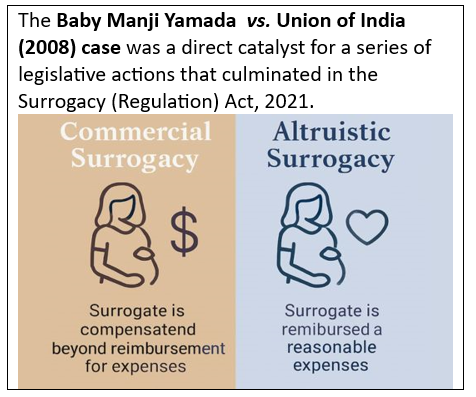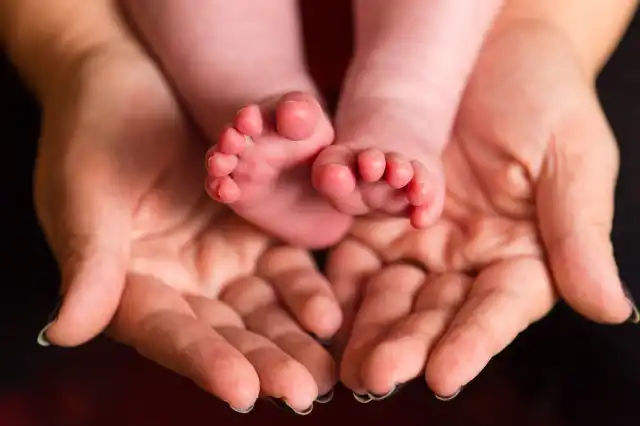Syllabus:
GS-2: Government policies and interventions for development in various sectors and issues arising out of their design and implementation.
Context:
Recently, the Supreme Court ruled that the age limits under the Surrogacy (Regulation) Act, 2021, do not apply to couples who had frozen their embryos and initiated the surrogacy process before the law came into force on January 25, 2022.
More on the News
- Petitioners argued that the application of age caps retroactively deprived them of their vested Right to parenthood, violating Article 21 (personal liberty and reproductive autonomy) and Article 14 (equality before law) of the Constitution.
- The court reaffirmed the constitutional protection of reproductive autonomy under Article 21, holding that retrospective curtailment would frustrate the right to parenthood.
Surrogacy (Regulation) Act, 2021
Definition and Nature of Surrogacy
- Surrogacy is defined as the process where a woman bears a child for an intending couple and hands over the child after birth.
- The Act permits only altruistic surrogacy, prohibiting any commercial surrogacy or monetary gain.

Eligibility Criteria for Intending Couple
- The intending couple must be legally married for at least five years.
- The wife must be aged between 25 and 50 years, and the husband must be between 26 and 55 years of age.
- The couple must not have a living child, except in cases where the existing child is disabled or suffers from a life-threatening condition.
- The intending couple must obtain eligibility and essentiality certificates from the prescribed authorities before proceeding with surrogacy.
Eligibility Criteria for Surrogate Mother
- The surrogate mother must be a close relative of the intending couple.
- She must be married and have one biological child of her own.
- Her age must be between 25 and 35 years.
- A woman can act as a surrogate mother only once in her lifetime.
Regulatory Mechanisms
- The Act mandates the creation of National and State Surrogacy Boards for regulation and oversight.
- All surrogacy clinics must be registered and adhere to prescribed standards.
Offences and Penalties
- Commercial surrogacy, sale of embryos, or exploitation of surrogate mothers are offences punishable with imprisonment of up to 10 years and/or a fine up to ₹10 lakh.
Rights and Status of the Child
- The child born through surrogacy is legally recognized as the biological child of the intending couple.
- Abortion during surrogacy is allowed only with the surrogate mother’s consent and in accordance with the Medical Termination of Pregnancy (MTP) Act provisions.
Assisted Reproductive Technology (ART) 2021:
Scope and Registration
- The Act regulates assisted reproductive technology procedures such as IVF, sperm and egg donation, and embryo transfer.
- ART includes any handling of sperm or eggs outside the body to achieve pregnancy, including techniques like IVF and ICSI.
- All ART clinics and ART banks must register with a National Registry, and their registration is valid for a period of five years.
Eligibility and Restrictions for Donors
- Sperm donors must be men aged between 21 and 55 years.
- Egg donors must be married women aged between 23 and 35 years, with at least one biological child aged three years or older.
- Each woman can donate eggs only once, and a maximum of seven eggs can be retrieved per donation.
Prohibitions and Safeguards
- The Act prohibits sex selection and advertising of ART services.
- Only one intended couple may use the sperm of a single donor.
- Written consent and appropriate insurance coverage for sperm and egg donors are mandatory.
Child’s Legal Status and Board Oversight
- Children born from ART procedures are legally the biological children of the intended parents, and donors have no parental rights.
- The Act mandates the establishment of National and State Boards (the same as Surrogacy Boards) to oversee policy formulation, standards, and ethical compliance.
Penalties
- Offences such as sale of embryos, child abandonment, or exploitation are punishable with fines ranging from ₹5 lakh to ₹10 lakh for the first offence, with imprisonment of 8 to 12.
Sources:
The Hindu
The Hindu
Indian Express

